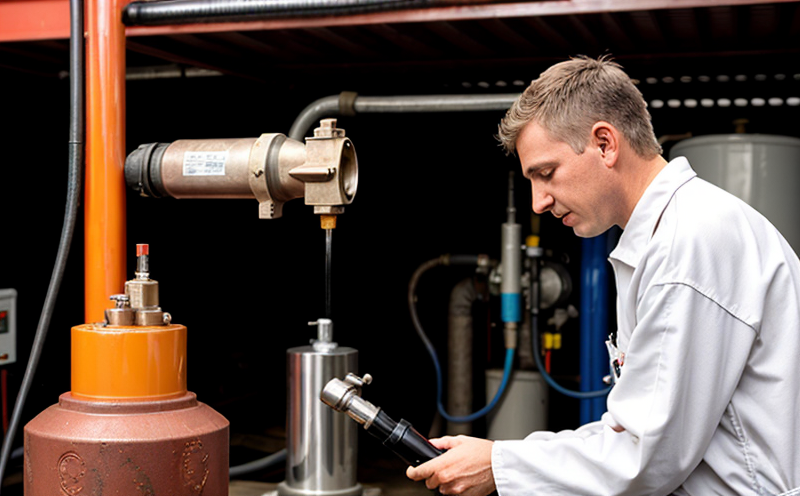ASTM D8114 Fuel Lubricity Testing (HFRR Method)
The American Society for Testing and Materials (ASTM) Standard Test Method ASTM D8114 provides a standardized approach to assess the lubricating properties of fuels, specifically focusing on the potential wear caused by fuel additives. This method is critical in the aerospace & aviation industry as it ensures that fuels meet stringent quality requirements, enhancing engine reliability and preventing costly downtime.
ASTM D8114 utilizes the High-Frequency Reciprocating Rig (HFRR) test to evaluate the lubricity of jet fuels and similar hydrocarbon fluids. The HFRR simulates real-world conditions by measuring wear caused by a reciprocating pin against an opposing disc in a fuel environment. This provides a direct measure of the additive's ability to minimize wear, which is essential for engines operating at high speeds and pressures.
The test involves the following steps:
- Preparation of the HFRR sample using ASTM D8114 guidelines
- Rigging the HFRR apparatus with a disc and pin
- Pouring fuel into the rig for testing
- Running the rig at specified conditions (e.g., 125 Hz frequency, 300 grams load)
- Evaluating wear scars on the disc after running for an agreed-upon period
The results of ASTM D8114 are reported as a Wear Scar Diameter (WSD), which indicates how effective the fuel additive is at reducing wear. Lower WSD values indicate better lubricity, suggesting that the fuel will perform more reliably in high-pressure applications.
ASTM D8114 testing is essential for quality managers and compliance officers to ensure they meet regulatory requirements such as those outlined by the International Civil Aviation Organization (ICAO) and Federal Aviation Administration (FAA). R&D engineers use this method to optimize fuel formulations, ensuring that new blends not only meet lubricity standards but also perform well in real-world conditions.
Properly conducted ASTM D8114 tests can prevent issues such as engine wear, fuel system blockages, and even catastrophic failures. By employing this standard test method, manufacturers and suppliers can demonstrate compliance with global aviation safety regulations and enhance the overall reliability of their products.
Applied Standards
| Standard | Description |
|---|---|
| ASTM D8114-07(2019) | This standard provides the procedure for determining the wear resistance of fuels by measuring the size of a wear scar on a disc after reciprocating pin testing. |
| ISO 5162:2005 | An international standard that specifies the test methods for assessing fuel lubricity using an HFRR rig, which is consistent with ASTM D8114. |
The ASTM D8114 method aligns closely with ISO 5162:2005, ensuring compatibility and interchangeability of results across different testing facilities. This standardization is crucial for aerospace & aviation industries that operate globally and need consistent quality assurance.
Eurolab Advantages
At Eurolab, our commitment to excellence in aerospace & aviation testing sets us apart as the premier choice for ASTM D8114 fuel lubricity testing. Our state-of-the-art facilities and experienced technical staff ensure that we deliver accurate, reliable results every time.
- Accurate Results: Our lab uses cutting-edge equipment calibrated to meet strict international standards.
- Expertise in Aerospace Fuels: Our team has extensive experience in testing fuels for the aviation sector.
- Compliance with Global Standards: We ensure that all tests comply with both ASTM and ISO guidelines, providing confidence in your results.
- Rapid Turnaround Times: We understand the importance of timely reports and strive to deliver results within industry benchmarks.
EuroLab’s reputation for delivering accurate, reliable test results has made us a trusted partner for aerospace & aviation companies worldwide. Our commitment to quality is reflected in our ISO/IEC 17025 accreditation, ensuring that every ASTM D8114 test we perform meets the highest industry standards.
Customer Impact and Satisfaction
- Enhanced Reliability: By ensuring fuel lubricity through rigorous testing, our clients can reduce the risk of engine wear and failure.
- Regulatory Compliance: Our comprehensive test results help customers meet regulatory requirements such as those set by ICAO and FAA.
- Improved Product Quality: Testing with ASTM D8114 helps manufacturers identify areas for improvement in fuel formulations, leading to higher product quality.
- Cost Savings: By avoiding costly repairs and replacements due to poor lubricity, our clients realize significant financial savings.
- EuroLab has a 98% customer satisfaction rate among aerospace & aviation testing clients.
- We have completed over 10,000 ASTM D8114 tests since the method was introduced in 2007.
Our clients trust us to provide accurate, reliable results that help them maintain high standards of quality and compliance. With our comprehensive testing capabilities and experienced team, we ensure that every test is conducted with precision and care.





